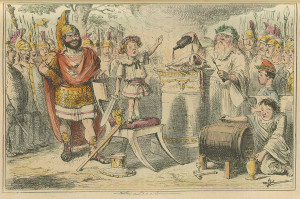
via Wikimedia Commons
The often-repeated saying goes that without studying the past, we are doomed to repeat its mistakes in the present (and future). Many consider this to mean that history as a university discipline aims to construct a mental tome of sorts, overflowing with historical facts in meticulously detail, and which one can crack open when in need of some age-old advice. Yet, being a student of history involves more than simply memorizing the events of the past. Instead, history majors look towards a greater understanding of the patterns, the causes and effects, of human behavior and existence. As a history major, you’ve certainly been inundated with a fair share of facts – dates, wars, casualties, treaties – but these are stepping stones towards the greater goal of understanding the ways in which human beings have come to live in the present, not simply that they do.
In the 2010-11 academic year, 177,000 history and social science bachelors degrees were awarded to graduating students, making it one of the more popular degrees awarded, although this figure must be taken with a grain of salt as it is combined with the other social sciences, some of which – sociology, for example – are becoming increasingly popular.
A useful study conducted by the Vanderbilt University History Department of their own alumni helps shed some light on the breakdown of history majors following graduation. Like many disciplines in the humanities, these figures support the trend that those who study disciplines such as history go on to work in a highly varied number of positions. The study shows that 30% of history graduates go on to work in the business sector and, somewhat surprisingly, 90% of graduates reported back that their History degree was directly useful to them in their positions.
About 6.5% of history majors are unemployed, with salaries ranging from $34,000 to $84,000 and a career outlook in the most popular positions ranging from “normal” to “good”. The higher end salaries are correlated with those that pursue careers in law and other positions that often require some sort of postgraduate education for jobs such as historian, or curator.
That being said, the skills that you have developed as an undergraduate history major can also launch you into an entry-level job attainable for those with a bachelor’s degree.
As a history major, you’ve read. And you’ve read. And then read some more. And then you’ve written, and written.

via Flickr user Wyoming_Jackrabbit
A somewhat unique aspect to History as a university discipline is that it, well, must be grounded in historical truth; there is less room for theorizing when it comes to history, than, say some of the related disciplines in the humanities. As a result, most any effort made in your years as a history major have been backed by considerable evidence found through thoroughresearch. Your arguments have been couched in evidence that can support your claims, as historical creativity can flourish in finding interesting linkages between factual events that help to illuminate greater patterns of human thought and behavior.
Armed with the research conducted to support your claims, history majors are apt at conducting critical thinking and analysis in order to uncover the importance of historical occurrences. Here is where history majors get to flex a degree of creative thinking: in analyzing and viewing the events of history with a critical and inquisitive lens, students of history are able to tease apart the finer threads of historical powers, peoples, parties, etc. to uncover the meaningful patterns of the historical record. With so much factual information available, it may be said that history really only becomes meaningful when a history major uses his or her skills in order to make sense of what’s available.
The history majors aims to offer novel and interesting perspectives on historical developments, solve problems that arise in our understandings of the historical record, and reinterpreting and challenging the predominant conceptions of history. As they say, history is always written by the victor – but German Philosopher Walter Benjamin might insist that it’s all of those people who built history – not simply those that sat atop it – that are the truly meaningful actors of our past.
Following the thorough research you’ve done to support your claims, as a history major you’ve time and time again put your communication skills to the test. This likely involved both written and oral modes of communication. It’s no simple task to write an effective history paper that smartly uses historical evidence to support claims, and any time you’ve raised your hand in a history seminar the words that come out of your mouth better be not only well-backed with historical evidence, but also well-spoken.
Although you might not be able to tell from looking at them, to be a history major one needs to have their fair share of powers of creativity. To relate between the past and present requires creative thinking, linking historical events to explain a particular trend or happening. The causes and effects of history are not always clear-cut, and there’s quite a store of information to pull from when it comes to writing or speaking about history, and as such history majors develop a creative and quick-thinking mind that is capable of finding connections between vast amounts of highly varied information.
There is no clear-cut career path for History majors. However, that also signifies that History majors can graduate and enter into many different possible areas of work.
Editorial Assistant
Median Salary: $31,000
What follows logically from the mountains of pages you’ve read and written over the past few years is a job that employes those same skills. In such a way, a position as an editorial assistant can be a perfect fit for a history major entering the workforce. The strict requirements that come with writing about history lead to an attention to detail in history majors that translates well to positions that include not only writing your own pieces, but also editing those of others. History majors can find employment write in a number of different capacities, from writing about history itself to television and film media, journalistic pieces, brochure and nonprofit organization literature , museum captioning, etc.
Research Assistant
Median Salary: $39,000
A history major can apply their skills in researching to quite a large number of different industries. From fact-checking to story research, the detail-driven and research-intensive work ethic of a history major can be applied to media, business, education, and more.
Archivist
Median Salary: $44,284
Finally, working as an archivist may be a viable entry-level position for recently graduated history majors. Archiving positions can be found in government, business, education, community organizations, internet archives, unions, and more. Essentially, the role of the archivist is to manage the information of an individual, business, institutions, and other groups. These records can span multiple forms of media and are pivotal to the smooth running of an organization; whether it be for record-keeping, tax, or law-related purposes, a well-curated and neatly organized archive contributes greatly to the continued steady operation of a business. The hours spent establishing a foundation of historical knowledge, cataloguing those facts and figures into a useable format, and synthesizing the data into papers and presentations helps a history major to be well-suited for a position in archiving.
Get writing! Your abilities to research and write are some of your more marketable, so it’s important to have an easily accessibly portfolio or blog that can showcase these skills. It doesn’t necessarily need to be in-depth historical analysis, but showing productive energy behind an area of interest can help to advertise your strengths.
| Asset Manager Wallick Communities New Albany, OH | View |
| LPC (Remote) Headway Columbus, OH | View |
| Sr. Risk & Quality Performance Manager (Remote) Molina Healthcare Columbus, OH | View |
| LPC (REMOTE) Headway - Design & Development Columbus, OH | View |
| Entry-level AML Investigator - Financial Crimes (Remote) AML RightSource Columbus, OH | View |
| CRISIS COUNSELOR - FULLY REMOTE IN NEW MEXICO ProtoCall Services Columbus, OH | View |
| Data Entry Clerk - Work Remotely Recruit Monitor Columbus, OH | View |
| Commercial Title Examiner Solugenix Corporation Columbus, OH | View |
| Provider Data Services Senior Coordinator- Work From Home CVS Health Columbus, OH | View |
| Document Review Attorney - California Barred, Fully Remote! Adams & Martin Group Columbus, OH | View |